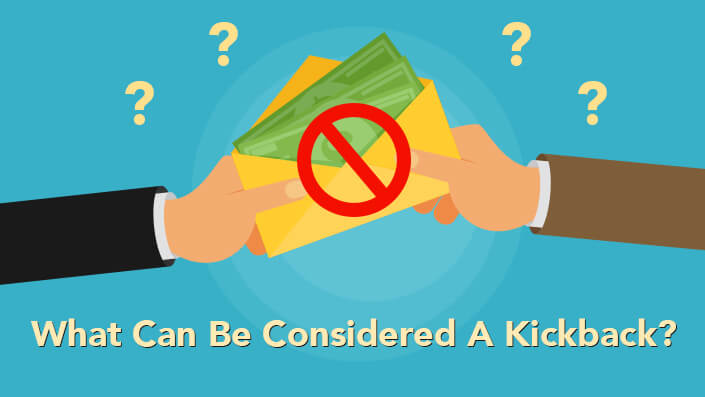
Understanding How RESPA Section 8 and California’s Regulating Laws Affect The Real Estate, Title and Escrow Industry
The settlement services or “escrow” industry is a very competitive one. Competition, you might say, is good; it gives the opportunity to provide better service to consumers, obtaining business by merit. The trouble comes when the consumer is not involved in the choices, but are led to the choice made by their representative. This opens the opportunity for the paying of something of value to the representative to bring in their business. The term for this practice is KICKBACKS, or, a more descriptive “Pay to Play”. The following write-up may focus on this issue in this particular industry in California, but it is nationwide and affects many, many other industries.
There are two areas of regulation to consider in regards to kickbacks, the Federal and State level.
The Federal Regulator. The main Federal regulators of the 1974 Real Estate Settlement Procedures Act (RESPA) are the Department of Housing and Urban Development (HUD) and the Bureau of Consumer Financial Protection (BCFP), which was previously known as the Consumer Financial Protection Bureau (CFPB). The “anti-kickback” law can be found under Section 8 of RESPA; a link to an article which lays it out pretty succinctly can be seen here. In the last few years the matter has been given a lot of attention by the Bureau of Consumer Financial Protection as evidenced by their own Bulletin, which can be accessed here. They are particularly interested in catching illegal kickbacks through marketing servicing agreements entered into between real estate companies and title agents. The enforcement path carved out by the BCFP is littered with RESPA Section 8 kickback violation enforcement actions.
The State Regulators. In California, competition in this area of settlement services does not come from a level playing field. There are three different types of settlement services companies governed by three different regulators under three different laws.
- Independent Escrow Companies are governed by the Department of Business Oversight (DBO), previously known as the Department of Corporations (DOC). The anti-kickback law is found in the Financial Code under Section 17420. It states that “Except for the normal compensation of his own employees, it shall be a violation of this division for any person subject to this division to pay over to any other person any commission, fee, or other consideration as compensation for referring, soliciting, handling or servicing escrow customers or accounts.” Here is the link to a 2007 Bulletin – the content guidelines in which has not changed through the years.
- Title Company Escrow Departments are governed by the Department of Insurance. Look to Section 12404 of the Insurance Code for penalization for the payment of inducements or access their bulletin here.
- The Real Estate Brokers and their escrow departments are governed under the California Department of Real Estate (DRE) and their Real Estate Law can be found under the Business and Professions Code Section 10177.4. Here is a link to the latest Real Estate Bulletin which mentions this.
Three different governing agencies, three different regulatory laws for more or less the similar action. Unfortunately, the overseeing of the laws is extremely uneven. The question you as a reader will ask is, “Why should I, the regular citizen, be interested in this?”
Consumer Protection. Why are there so many laws? Why is this such a big deal, you might ask? It is the intent of the laws to protect consumers and the public, so that they are assured the best service for their money and are not subject to the possibilities of their representatives directing the business one way or another because they have received outside “compensation”. We are familiar with this; we see it on the news daily – political/lobby groups trying to influence politicians via donations to them and their PAC funds. When your representative is choosing the company that will handle your transaction, does he have the your best interests in mind?
Unfair competition. There are almost 1,000 independent escrow companies and branches of all sizes in California. Added to that, the Title companies all have their own escrow departments wherein many transactions are fed to them internally from their title customers. In recent years with the boom in the real estate market, many real estate brokers have also opened their own in-house escrow department with transactions that are fed from the brokerage side. Yes, lots of competition. Different types of companies, different sets of regulations. Oversight by the regulators are uneven; some are strict, others might hardly have any. We are competing for business on a very uneven playing field.
Bringing in the business. You offer a good product. You offer better customer service. You smile! What if that’s not enough to bring in the business, keep the client, and/or increase market share? Most of our business comes from the real estate agent who brings in the transaction. They become more of our “client” than the actual Buyer/Seller/Borrower customers. We may feel we have to offer more to keep these clients. You thank the person who brought you the business with a token of appreciation. You wine them, you dine them, you give them gifts, you even pay for catering events for them. As the expectations increase through the years the expected gifts become more and more expensive. LV purses, Dom Perignon. Where does it stop?
We hear rumors of escrow officers paying the real estate agent cash, under the table, for transactions. “Cash” may be anything of value. $1,000 under the table is certainly “cash”, but so is a “Payday candy bar” delivered with the closing paperwork (an example used by the DBO). There are real cases of big time offenders, which the BCFP have cracked down on, like the settlement services company who put a member of a real estate broker’s family on the payroll as a “consultant” without ever asking them to do any work.
Unfair and deceptive practices. What if you don’t do any of the above, but offer to incentivize or thank an actual customer (let’s say the Seller) by offering a discount on the escrow fee to him only and not to the Buyer of the same transaction? That too, is considered a “kickback” and not only that, under the federal Dodd Frank Act, it is a violation of the Unfair, Deceptive or Abusive Acts Practice Act (UDAAP). If you are giving something of value to one party, you must give the same to the other OR you must disclose it to the other party. You want to charge the Seller an escrow fee of $500 and then charge the Buyer $2,000? You need to fully disclose the discount in writing to the Buyer.
As mentioned previously, the different governing agencies give this matter different weight due to lack of manpower, lack of resources, or lack of interest in the midst of other important issues. The DBO and the DOI have increased their vigilance and companies caught violating their respective laws will be given notices to stop or face penalization or even loss of license. They both rely heavily on information and proof provided by whistleblowers.
Violations. The four words to guard against: “A Thing Of Value”. Cash is a thing of value. A discount is a thing of value. Tickets to the local theater are a thing of value. Here is a general list of violations, considered “a thing of value” that everyone should be aware of. Most of this is aimed at the interrelationship between escrow, title and real estate broker/agents.
- Producing or copying fliers or advertising/marketing materials for brokers/agent.
- Producing web pages or web sites for broker/agent’s listings or advertisement.
- Buying office equipment for the broker/agent.
- Sponsoring seminars or other events for one particular broker/agent.
- Sponsoring or providing catering for broker/agents’ grand openings, open houses, meetings, lunches or other events.
- Offering a reduced escrow fee for clients of a certain brokers/agent without full disclosure to the other principal.
- Discounts offered to principals as a marketing initiative must be offered to all principals during the marketing period.
- Providing any business services to broker/agents, such as listing reports, listing postcards, farm reports, accounting services, marketing support, etc.
- Providing tickets to sporting or other events.
- Paying costs normally paid by the client, such as the Transaction Coordinator fee, HOA fee, or any other fee.
- Giving of gifts, no matter the cost, to broker/agent on any occasion, including birthdays and holidays.
- Providing gifts, no matter the cost, including door prizes at a broker/agent sponsored events.
- Making donations to a particular broker/agent charity event.
- Wining and dining the broker/agent.
- Giving educational seminars to that one broker/agent office.
- Allowing the broker/agent to use the escrow office to hold meetings.
- Clicking “Like” on a broker’s listing post on FaceBook or other social media platforms.
To report violations to the regulators requires proof. Most are very cognizant of the illegality of kickbacks so proof is hard to come by. Stories, however, abound and with the advent of technology, some of the stories can be turned to proof. Here are some examples to give a general idea.
- Escrow Officer takes her real estate clients shopping on Rodeo Drive.
- Real Estate Agent asking upfront for the payment of cash to bring in the transaction.
- Escrow Officer paying for staging fees for a transaction.
- Escrow Company marketing team putting together a full lunch spread at realtor’s Open House.
- Real Estate agents thanking Escrow Officer on social media for Christmas gift (including a picture of gift)
- Real Estate agents asking for a free escrow for their own transaction.
Crazy, isn’t it?
Allowed marketing tools. Is there such a thing as “legal kickbacks”? Maybe in the football world, but in the real estate world there is no such thing. There are certain things that you can do:
- Providing educational events/seminars to the whole realty board, not directed to just one office.
- Providing food and catering for events held by or on behalf of the whole realty board.
- Give promotional items of limited value – pen, pencils, etc. – at events which encompasses all brokers/agents.
- Donating of gifts or door prizes at realty board events where anyone can win.
- Providing a discounted escrow fee to one party and giving the other party the same discount.
- Or, providing a discounted escrow fee to one party and the other party acknowledging in writing the reduced fee given to the other party.
The guideline is: Don’t make it available to just one person or one group; make it available to everyone.
If you need to “Pay” for your business, no matter how innocuous the payment is, you are still breaking the law, federal or state. Remember, it is illegal to give and it is also illegal to receive. No one wants to be caught by their regulators, or get corralled by the BCFP for violations. Notice of infraction, desist and refrain, monetary penalties, loss of license, loss of livelihood, none of these are worth the while. The biggest case to date which generated nationwide attention is the PHH vs CFPB case in which CFPB fined PHH $109 million in penalties for kickbacks. The case went to the US Appeals Court and the penalties were vacated in 2017, but it shows you the depth of interest, federally and statewide, when these kickback issues come up.
The point of this article is simple : Be aware that no matter if you are asking for a thing of value or giving it in return for business, think before you act. You may think the value is minimal but you could be still be committing an illegal act.
Human greed, cut throat practices against competitors and the custom of buying the business exists everywhere. For those companies who follow the straight and narrow path and do the right thing it is a bitter pill to swallow when they see those who do not. It is a tough subject to talk and write about.

Juliana Tu, CSEO, CEO, CBSS, CEI, SASIP
Escrow Manager

Good news! “The Art of Escrow” is out! Look for it on www.amazon.com!

The Art of Escrow:
The Fight For Your American Dream and the Pursuit of Homeownership
Available now at Amazon.com
- Threats to Escrow – Part 5 – Document Fraud! - May 19, 2023
- When the Loan Got Sold and You Just Closed Escrow - April 6, 2020
- Mechanics Lien - October 7, 2019
- Are You a Foreigner and Need to Know About U.S. FIRPTA Withholding Laws? - February 20, 2019
- When the FIRPTA
Withholding Goes Wrong - February 20, 2019
Join Our FREE Viva Escrow Forums
